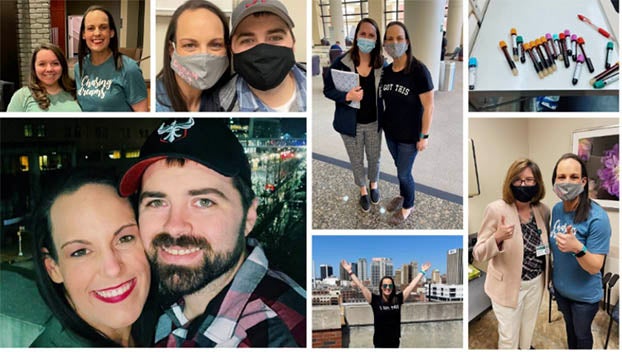Alabama woman wants a baby. But first, she needs a uterus.
Published 6:10 am Sunday, July 18, 2021
Elizabeth Goldman is on a mission. Born without a uterus, she once thought her lifelong dream of having a baby of her own would never happen — but now she is on the verge of making that dream come true. The Mobile native is the first patient in a new program at the University of Alabama at Birmingham, and, if all goes as planned, she will be the first in the state to undergo a uterus transplant.
Through the Facebook group she created, Goldman Baby Adventures: Elizabeth’s Uterus Transplant and IVF Journey, as well as promotion on her own social media and a fundraising website, Elizabeth has spread the word about her highly personal story, not only to raise money for the expensive in-vitro fertilization procedure but also to convey that there is hope for other women in her situation.
“Elizabeth is a rock star,” says Dr. Paige Porrett, a professor of surgery in the UAB Division of Transplantation. “She’s an extraordinary champion for this mission.” Last year, at the height of the coronavirus pandemic, the surgeon and her family moved from Philadelphia, where they’d lived for the past 20 years, to Birmingham, so she could help establish the uterus transplant program at UAB.
Since she was a little girl, Elizabeth has dreamed of having a baby. But she didn’t know until she was 14 years old that she has a syndrome seen in one out of every 4,500 female births. “It was crushing,” she says of her diagnosis with the rare condition Mayer-Rokitansky-Küster-Hauser Syndrome, or MRKH.
And while she’s “Mom” to two young sons, they’re not her biological children. Elizabeth has raised her nephew, Jayden, now 9, since he was five weeks old. And her husband Timmy has an 11-year-old son, TJ.
Now 29, Elizabeth has always wondered what it would be like to feel a baby kicking inside her. To hold the baby right after it’s born, looking for resemblances to herself and Timmy. To watch that baby grow up. To complete their family. And maybe even to bring a second baby into the world, eventually.
“Not a day goes by that it’s not in the center of my brain,” she says.
For years after her devastating diagnosis, she kept it to herself. “I can count on two hands the number of people who knew this about me,” she says. Even after eight years of marriage, members of her husband’s family and her own extended family were unaware of her condition. Again and again over the years, she and Timmy were asked when they were going to have a baby.
Then, in 2014, Elizabeth read about the first uterus transplant in Sweden.
She waited for the procedure to become a reality in the United States — and it did, at Cleveland Clinic, Baylor University and the University of Pennsylvania. Then, last fall, she learned that UAB was starting a program just 250 miles away from her home in Mobile. The UAB program is the first of its kind in the Southeast.
‘IT’S A COMMITMENT’
The entire process has been a waiting game. Elizabeth found out about the UAB program last October and was the first woman in the state to apply. In January, she had a Zoom call — “the most important call of my life,” she says — with the transplant coordinator and surgeon, Dr. Porrett. After more waiting, more calls and a three-day evaluation spent meeting with the various doctors and other specialists who comprise her transplant team, she was officially accepted as the first participant in the program on April 6.
“Each wait brings its own set of emotions and feelings,” she says, “as well as another level of strength you didn’t know you had.”
While UAB will cover the costs involved in the uterus transplant itself, as well as the anti-rejection medications Elizabeth will have to take after the surgery, the couple is responsible for the IVF procedures, which aren’t covered by insurance. Once Elizabeth is pregnant, her insurance will kick in, she says.
IVF is an expensive process. For her first IVF procedure, she raised about half of the $16,000 total through online fundraising and financed the rest. After giving herself 55 injections, and enduring more waiting, she ended up with one genetically tested embryo — but she needs to have two to qualify for the transplant. This week, she and Timmy are starting the process all over again after raising more than $12,000 toward the second round of IVF.
The Goldman Baby Facebook group has gone from 100 members to more than 1,000, and Elizabeth continues to find creative ways to solicit help with the IVF costs through sharing videos, photos and information about her family. “People are getting emotionally connected to our story,” she says.
At the same time, they’ve been moving from the home they bought in Mobile last fall to an apartment in Birmingham. They will both start new jobs, with Elizabeth transferring from the hospital where she works in sterile processing, and Timmy quitting his job in auto parts sales to work for the Amazon fulfillment center there.
“We’re having to uproot our entire life,” she says. “It’s a commitment.”
Once the embryos are created, Elizabeth will be on the transplant list until a deceased donor is found and she is called for the eight- to 10-hour surgery. Six months later, one embryo will be transferred and, if everything goes as planned, she will deliver Baby Goldman via caesarean section at 37 weeks.
Elizabeth regularly talks to several other women who have undergone uterus transplants. “All but one of them have had babies,” she says. Just as they make her more determined to have a baby of her own, she is serving as an inspiration for others. Because of her visibility on social media, she has received messages from other MRKH patients as well as those who have experienced uterine factor infertility because they’ve had a hysterectomy or their uterus doesn’t function properly.
After she was interviewed by a local TV station, she heard from a woman whose daughter just found out, at age 15, that she has MRKH. “I remember being that age,” Elizabeth says. “Until you actually meet somebody, you feel like you’re the only one in the world who has it.”
She also has complete confidence in her surgeon, Dr. Porrett. “She’s done three transplants so far, and all of them were successful and had babies,” she says. “That’s why it’s not scary.”
‘SHE IS UNSTOPPABLE’
Dr. Porrett was somewhat skeptical of the idea of a uterus transplant when she first learned about it while serving as a faculty member at the University of Pennsylvania. “I thought it was too fringe for me,” she admits. “I was not a fan.”
But she changed her mind, she says, when she started meeting patients whose lives could be changed by such a transplant. The first live birth in the uterus transplant clinical trial at Penn Medical was Jen Gobrecht, who, like Elizabeth, had MRKH. “When she had her baby, Benjamin, I was transformed by that experience,” Dr. Porrett says.
While the program at Penn had been intended to be a feasibility clinical trial on a small scale, Benjamin’s birth made Dr. Porrett realize “we have to go bigger than this.” At the suggestion of a friend, she reached out to UAB, which “wanted to be the first in the world to offer a transplant outside of a clinical trial,” she says. “I wanted to be part of that team.”
She saw UAB’s new uterus transplant program as “an opportunity to change the world.”
While MRKH patients like Elizabeth and Jen represent the majority of uterus transplants so far, Dr. Porrett sees tremendous potential for the procedure to help women whose uterine infertility is the result of a hysterectomy. “I hear them say how confused they were about accepting a hysterectomy to treat a medical condition,” she says. “Losing fertility is such a big deal.”
She predicts that “in five years, as this transplant becomes more commonplace, it will be restorative for women with hysterectomies.”
For Elizabeth, whose life in recent months has been devoted to bringing another life into the world, she finds it surreal that what she’s always thought would be impossible might actually be about to happen. When she becomes pregnant and carries Baby Goldman to term, it will be nothing short of a miracle. She’ll be the first to undergo a uterus transplant in Alabama and the 33rd in the United States.
“She is unstoppable,” Dr. Porrett says. “I’m confident she’ll be successful in getting to the finish line.”
To help Elizabeth and Timmy with their fundraising efforts, visit goldmanbaby.com.
For more information about UAB’s uterine transplant program, call (833) 822-2841.





